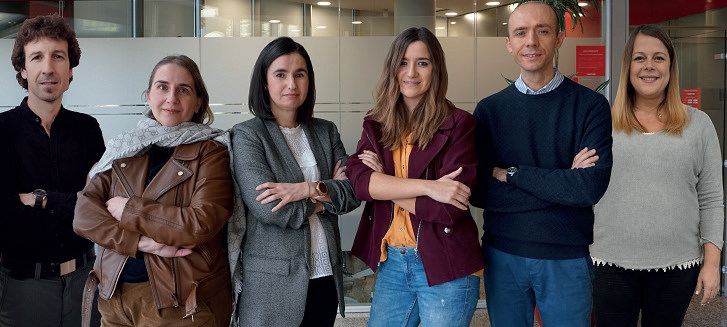IPSICO SI24, good practice
for psychosocial risks implemented in Spain
Long before the crisis caused by the global pandemic forced us to change our physical work environment, at MAPFRE we were already heavily committed to analyzing psychosocial risks, with the aim of taking care of our personnel. An analysis which, in these first few months of 2020, has become even more important. In this article we tell you about the study carried out in Spain to analyze the conditions of a key sector in our company, those who provide our telephone support service. The goal was to boost the motivation, satisfaction and performance of all these employees.
TEXT MAPFRE Joint Prevention Service in Spain | IMAGES MAPFRE
Reactions to a particular psychosocial situation are not the same for all those working there; rather, they depend both on how each of them perceives it, and on their ability to cope with, or respond to, that situation. Therefore, the way we manage these psychosocial factors can affect our motivation, satisfaction and how we perform our work.
In Spain, MAPFRE periodically evaluates the psychosocial risks within the organization, thus obtaining an overview of what lines of action need to be adopted in order to control and prevent them.
According to the 7th National Survey of Working Conditions conducted by the INSST (National Institute of Occupational Safety and Health), there has been a rise of 120 percent in psychosocial-related measures in Spanish companies, with respect to other preventive activities.
MAPFRE is committed to people and one of its objectives is to improve work environment conditions through an analysis of the associated psychosocial risks.
Thus, the IPSICO SI24 study was born
With the intention of advancing further in psychosocial well-being, between June 2018 and October 2019 MAPFRE conducted a specific study based around its particular needs and circumstances, the results of previous evaluations, etc. It was initiated with the SI24 telephone support service workers in Spain and, for this reason, it was referred to as IPSICO SI24.
This study represented a tremendous challenge for MAPFRE’s Joint Prevention Service in Spain. A multidisciplinary task force was created, comprising four accident prevention advisors, an occupational physician and a labor relations lawyer. The aim was for them to generate more – and, above all, more valuable – information, seeking synergies and boosting creativity and innovation, all from an integral perspective. Also collaborating in the study were the Workers’ Legal Representation and AFFOR, a consultancy specializing in the psychosocial field.
The SI24 workers were chosen to start this project, given the characteristics of their work, namely offering telephone attention. According to previous studies in the sector, this is one of the most gravely affected, since there are multiple risk factors inherent in their activity: pace of work; extreme psychological demands at both the cognitive and emotional level; maintenance of constant attention level on the task at hand; processing of information which calls for an immediate response… In addition, there are over 1,000 people in this population group in Spain, which enabled a sufficiently representative sample to be obtained.
They are distributed around seven locations and provide telephone assistance to MAPFRE policyholders 365 days a year, 24 hours a day.
Increased accident prevention activities
- Handling or breathing in substances or mixtures …
- Biological agents
- Safety of machines, equipment and material
- Radiation
- Vibrations
- Thermal environment (temperature, humidity)
- Safety of the installations
- Noise
- Working postures, physical effort and movements
- Workstation design (office furniture, space…)
- Organizational and other psychosocial aspects

How the IPSICO SI24 study went
First of all, it was necessary to take into account aspects such as similarity of tasks and functions when it came to defining the Units of Analysis (UA), in order to ensure confidentiality and anonymity. Employing these criteria, 18 UA were defined, mainly divided into telephone service managers, coordinators, supervisors, etc.
IPSICO SI24 is a research study based on the triangulation of information, where three sources are used in a systematic, organized way to analyze and validate the data obtained. The techniques employed were both quantitative (FPSICO 4.0 questionnaire) and qualitative (interviews and focus group), thus reinforcing the reliability and validity of the data obtained. The study was conducted between June 2018 and October 2019, with the timeline being as follows:
First, a detailed analysis of the information was carried out, taking into account sociodemographic data and labor characteristics: job positions, functions, structures, seniority, training, tasks, etc., and stating the hypotheses of the study.
The FPSICO 4.0 questionnaire was then applied to all the workers, duly validated by the Labor and Social Security Inspectorate, with the aim of discovering their perception of this type of risk. The factors analyzed in this questionnaire are those shown in the table below.
The participation level was 80 percent, making the high response rate particularly noteworthy and one of the study’s strengths. Likewise, the sample proved valid and reliable (95 percent confidence interval).
In order to contrast the information obtained, they arranged personal interviews and a focus group. The carefully planned conversations were specifically designed to glean information on the pre-defined areas of interest.
The percentage sampled in the interview and focus group phase was around 20 percent, with 100 percent participation of those selected.
This successful degree of participation was achieved thanks to the systematic organization of each phase, the continuous, effective communication maintained throughout the process, and the intense involvement of managerial staff.
| Location | no. of individual interviews | nº of focus group | no. of participants in focus groups |
| Madrid | 12 | 6 | 50 |
| Ávila | 5 | 3 | 36 |
| Valladolid | 4 | 4 | 18 |
| San Cougat | 5 | 1 | 9 |
| Valencia | 3 | 3 | 24 |
| Teruel | 1 | 2 | 18 |
| Las Palmas | 8 | 2 | 18 |
| Totales | 38 | 21 | 173 |
The results of IPSICO SI24
This study allowed us to determine the group’s strengths and where there was room for improvement, and obtain the information needed to design a specific action plan.
The results were revealed by way of reports at different levels, both globally and by locations. A presentation model, designed exclusively by the Joint Prevention Service, summarized the so-called “psychospheres”, which makes it possible to analyze the marked difference with other organizations, as well as contribute added value to the study.
The various different psychospheres offer a global vision of all the psychosocial factors of the population group and the interrelations between each of them. Likewise, the various different risk factors analyzed, enabling the psychosocial conditions to be revealed in a practical, visual manner.
- Once the questionnaires, focus group study, interviews and an analysis of all the information obtained were completed, and bearing in mind one of the principal stated objectives, a specific action plan based on four main lines of action was defined and drawn up, with a view to boosting those factors that benefit the personal development and occupational well-being of workers, as well as that of the organization:
- Encourage participation through IPSICO Best Practice Groups and draft a Psychosocial Good Practices Manual.
- Implement an Employee Assistance and Support Program: #pae.
- Boost learning and the development of work teams through a Skills and Competencies Plan.
- Reinforce multidirectional communication and the communication channels.
IPSICO SI24 is an excellent example of the application of the stated MAPFRE behaviors:
- Innovate: Psychosocial Intervention is another way to study, understand and visualize psychosocial risks right from the application of methodologies through to the presentation of their results, as well as the definition and introduction of the Action Plan
- Collaborate: Psychosocial Intervention requires the collaboration of the different actors involved, sharing and contributing different synergies, perspectives and know-how.
- Be Agile: Psychosocial Intervention seeks to boost strong points and improve organizational aspects, so as to manage change and make decisions quickly and effectively.
FPSICO 4.0 QUESTIONNAIRE RISK FACTORS AND DESCRIPTION

Considers the rest periods the activity permits, in terms of both quantity and quality, and the effect of working time on social life.

Individual capacity and the possibility of managing and making decisions on aspects of the labor activity’s time structure, as well as on working procedures and organizational issues.

The level of work demands to which they are subjected. This is assessed according to time-limit pressures, attention strain, and the quantity and difficulty of the task.

The degree to which the company demonstrates its long-term personal concern for workers (promotion, training, career development, etc.), as well as the perception of both job security and the existence of a fair balance between what employees contribute and the compensation they receive for their work.

Sensation that the work, in itself, is of some significance and useful, throughout the company and for society at large, duly recognized and appreciated.

Definition of the roles fulfilled in each job position. Role clarity, role conflict, and role overload.

Different demands workers have to face, of both a cognitive and an emotional nature.

Participation in different aspects of the work and supervision of the tasks.

Aspects derived from the relationships that are formed between people in the work environment and “social support”, such as instrumental support or help from other people within the work environment (bosses, colleagues…) so as to be able to perform the work properly, and the quality of such relationships.




